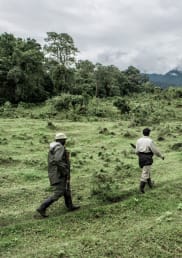Redressing the balance: Why we need more peacebuilding in an increasingly uncertain world
This report makes the case for redressing the disparity of effort and resources dedicated to peacebuilding versus other international interventions.
The advantages of peace are obvious: less suffering; more social and economic development; and greater shared security and prosperity – in a world where the great challenges of our time are rarely contained within the boundaries of one state.
Moreover, the imperative for peace has become even more urgent. Conflict is increasing (in both number and scale), millions have been forced from their homes and the international system is struggling to deal with the fallout. This is exemplified by the war in Syria, where hundreds of thousands of people have died and millions have been displaced.
Building peace means encouraging better, more inclusive governance, and people being safe from harm as well as having better livelihoods, wellbeing and access to justice. Where these conditions are not present, the seeds of division, distrust and violence can grow. Therefore, peacebuilding requires wide support, especially in the current climate.
While the concept and practice of peacebuilding has been with us for around 30 years and is increasingly – as a result of the conflict crisis – present in political rhetoric, it remains the poor cousin of other international interventions. By one estimate, annual expenditure on peacebuilding in 2016 was equivalent to less than 1% of the global cost of war that year and was dwarfed by the cost of development and humanitarian aid.
There are numerous reasons for this: decision-makers are unaware of the peacebuilding approaches available to them or are sceptical that they work; development, humanitarian, security or military approaches are more familiar; peacebuilding ‘takes too long’ for politicians and others with a desire for quick results, who too often wait until a crisis is upon them before acting; and vested interests stand in the way.
It is high time for this disparity of effort and resources to be corrected. This report sets out the case for this.



